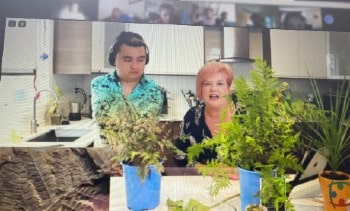Please visit our COVID-19 resource page for the most current information about Red Cross programs, support, and tips
It was 11 a.m. when science class started on Monday, August 17. A group of about 15 students was doing what students usually do before class starts: happily chatting about what they did on the weekend. There was nothing out of the usual until you looked closer and noticed the students ranged from a very young age to their senior years, and everyone was taking part in the class from their own home through a videoconferencing app. “It’s good that there are adults, teenagers, and children,” said Gail Berman, a 64-year-old student. This heterogeneous group is connected by a condition that is common to all of them: everyone has autism spectrum disorder.

When Judith Lee is ready to start teaching, she asks the students to mute their microphones. This particular lesson is on biology. They’re going to learn about ferns. By her side is a very special helper - her son Aiden, who also has autism.
Judith is one of the founders of Project Autism Canada, which has been providing free programs for people affected by the condition or other disabilities since 2013. “Aiden was just 10 years old and we could not find any help,” explained Judith. “We saw a need and founded Project Autism along with a small group of passionate individuals who believed that those with like mind and heart can make positive change in the world.”
In today’s class, Judith shows the different parts of a fern with Aiden’s help. The teenager holds one of the two plants on the table, while Ms. Judith, as she’s known to her students, points out roots, blades, and rhizomes. The microphones are no longer muted, and many of the Project Autism Learners (PALs, as they like to call the students) participate in the class helping to label each part of the plant. The different windows on the videoconferencing app show a number of hands raised. The more they interact, the more they are encouraged to continue, whether speaking or using the typed chat feature.
Although the program has been in existence for seven years, virtual classes only started in April when COVID-19 and physical distancing measures forced students and families inside leaving many feeling isolated. “Many of them were unable to go to school and without a sense of routine, which our community heavily relies upon, and connectedness, many families were struggling having to work from home while taking care of someone with exceptional needs,” said Judith.
With funding from the Government of Canada distributed by the Canadian Red Cross, Project Autism Canada adjusted to the new COVID-19 environment. By purchasing equipment for several volunteer instructors, they improved the technical quality of the classes. In addition, the funding allowed volunteers to create extra programs and offer them to those who do not have access to art and science kits. Since April, the project has broadcast 370 virtual classes on a variety of topics ranging from arts and crafts, to photography, math and music, benefiting over 5,000 participants.
Gail, who has attended the virtual classes since the beginning, has high praise for the project. “Even being at home, we should continue to learn things and be engaged with others,” she said. “I have learned a lot of interesting facts across many disciplines, such as science, art, culture, and more. I have also enjoyed interacting with other participants in our Zoom classes. This project has made a difference in my life.”
The Canadian Red Cross is funding the continuation of this work thanks to the generous support of the Government of Canada’s Emergency Community Support Fund granting program.
If your organization is a non-profit that delivers services to those who are the most vulnerable to the health and social impacts of COVID-19 you may also be eligible for grant funding or free personal protective equipment (PPE) and training.
A second round of funding, PPE and training is being made available beginning October 5, 2020. For more information, please visit www.redcross.ca/communityorganizations.

